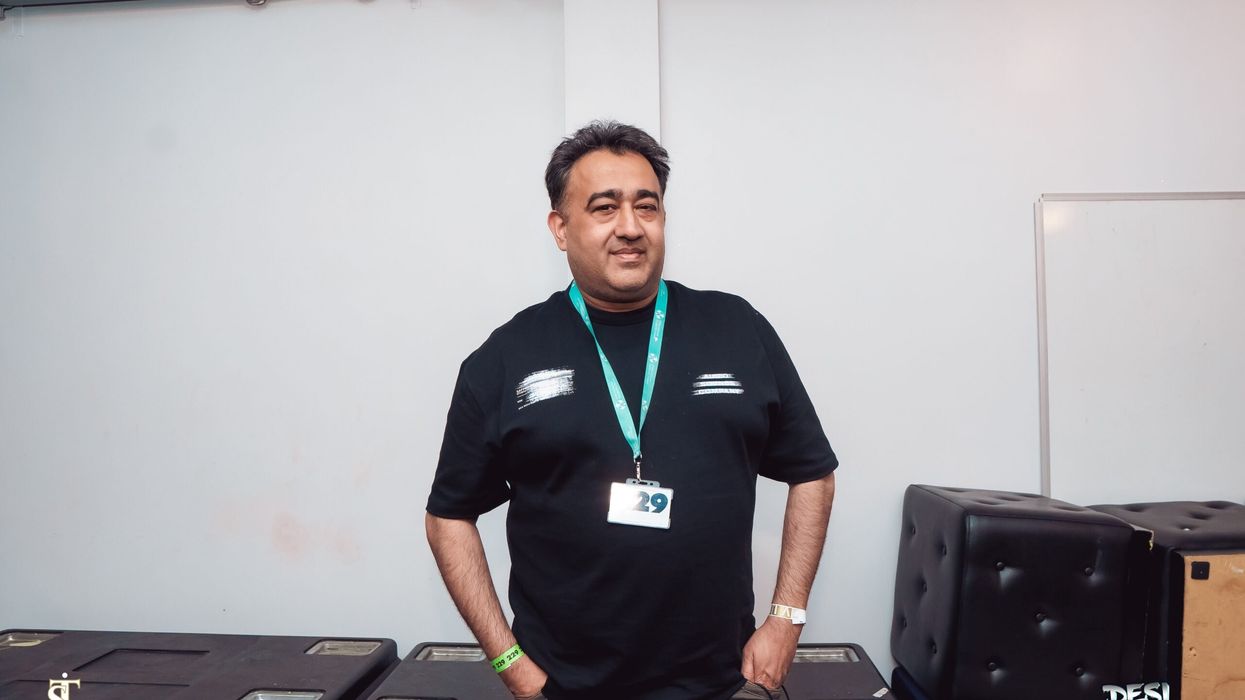SOLD-OUT concerts across the world demonstrate the enduring popularity of qawwali music. This timeless genre continues to cross creative horizons and keeps contemporary music fans connected to a centuries-old culture.
With October 13 marking the celebrated birth anniversary of the genre’s greatest exponent, Ustad Nusrat Fateh Ali Khan, qawwali music will be at the forefront this month.
One of the UK’s leading promoters of qawwali and its various sub-genres is Birmingham-based Abid Iqbal from Say Arts. He has brought international qawwali acts to British stages for decades, dating back to Rahat Fateh Ali Khan’s debut UK tour. His latest discovery, the Chahat Mahmood Ali Qawwali group, has delivered high-profile UK shows since last summer and established themselves as world-class performers. Later this month, the group will be part of a diverse lineup at the Musicport Festival in Whitby.
Eastern Eye caught up with the renowned British Asian music hero to discuss his journey, exciting new qawwali act, and the enduring popularity of Sufi music.
What do you most love about live music?
Live music possesses a physical quality. It resonates in the soul and engages the brain. You can feel the instruments and vocals reverberate through your body. It creates beautiful memories and brings diverse audiences together, creating moments that can’t be experienced with recorded music.
How do you reflect on your journey as a leading UK live music promoter and manager?
It’s a blessing. I stay focused by treating each day and event as if it were my first. I have reached this point without any shortcuts, working with incredible artists and creating wonderful memories for audiences along the way. There is so much more left to do.
You have brought many great acts to the UK. What do you look for in artists?
There is so much talent overseas, with hundreds of artists waiting to be polished and launched. Apart from talent, I focus on the character, honesty, and humility of the artist. Are they loyal to the art? Do they have a good reputation? Would UK audiences appreciate them?
You first brought Rahat Fateh Ali Khan to the UK. What are your memories of that?
When I worked with Rahat, he wasn’t the star he is today. He still jokes about how strict I was with him in those early days. We could all see how successful he would become during that debut tour. It feels good that I was there at the beginning with him.
What did you like about your latest discovery, the Chahat Mahmood Ali group?
The group is led by a father and son. The father, Mahmood Ali, has toured with my company, Say Arts, for 21 years. The naturally gifted lead singer, Chahat, was three months old when I first brought his father to the UK. The other group members are experts in their craft, including clapping, chorus, harmonium, tabla, and vocals. They have worked with top qawwali artists and toured the world. So, it was like bringing together a dream team led by the brilliant young singer Chahat.
What has it been like working with the group since last year?
Extremely rewarding. We have performed at nearly 200 events in the UK since last year. The demand has been high, and audiences, including leading dignitaries like the London mayor, have loved them.
What has been your most memorable moment as a collective?
All the shows have been memorable. Performing in Trafalgar Square for the London mayor, at the prestigious Southbank Centre, and for Mayor Rokhsana Fiaz in Newham were particularly special. Chahat becoming a student of Rahat Fateh Ali Khan during his 2023 tour was wonderful.
What was it like performing in Trafalgar Square?
The Greater London Authority were very professional. The organisers said it was the best qawwali group they have had in 19 years and wanted us back again. It was a wonderful audience of 20,000 people. Mayor of London Sadiq Khan loved the performance and met the group afterwards, which meant so much.
How highly do you rate lead singer Chahat Ali?
He is a versatile singer, only 21, who can perform qawwali, Bollywood, and Punjabi songs. No other qawwali singer has hit big international stages at such a young age and with so much maturity. He is a great learner and respects the elders in his group. He can maintain a strong vocal performance for three hours. I rate him very highly and believe he will become a huge global star.
Why do you think Sufi music is enjoying such popularity?
The lyrics have meaningful messages from the Sufis, passed from generation to generation. Icons like Nusrat Fateh Ali Khan and Rahat Fateh Ali Khan have kept this 700-yearold genre connected to worldwide audiences. As a live experience, there is nothing like it. Even if you don’t understand the lyrics, it still affects you. Social media is also playing a role in its popularity.
How much do you like that qawwali music has always connected with non-Asian audiences?
The pioneering collaboration between Muhammad Ayyub MBE of Oriental Star Agencies, Ustad Nusrat Fateh Ali Khan, Peter Gabriel’s Real World Record Label, and WOMAD festival opened the door to qawwali crossing over. Today, multicultural audiences worldwide appreciate it. On October 27 (my birthday), we will perform at MusicPort, which is a predominantly white music festival that has been going for 24 years in Whitby.
What inspires you?
Nusrat Fateh Ali Khan and the way he left a lasting legacy. It is timeless and magical, just like qawwali.




